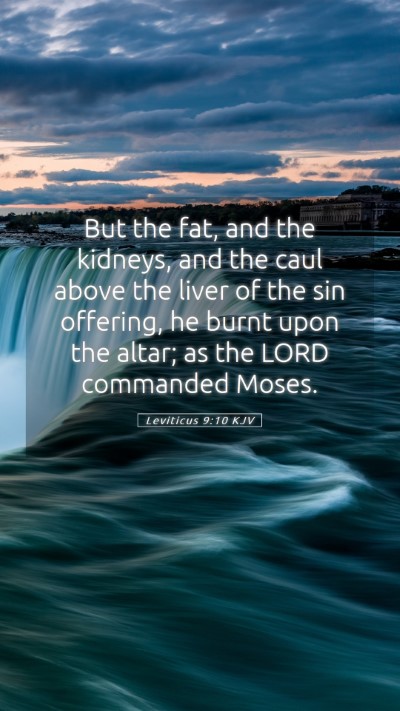Understanding Leviticus 9:10: A Comprehensive Commentary
Bible Verse: Leviticus 9:10
Verse Text: "But the fat and the kidneys and the appendage of the liver from the sin offering he took away, as the Lord had commanded Moses."
Introduction
In exploring the meaning of Leviticus 9:10, we delve into the significance of ritual sacrifices in the context of the ancient Israelite community. This passage illustrates the meticulousness required in the offerings presented to God and the importance of adhering strictly to divine instructions. Below, we combine insights from respected public domain commentaries, including those by Matthew Henry, Albert Barnes, and Adam Clarke, to provide a thorough explanation of this verse.
Contextual Background
The Book of Leviticus is primarily a manual for worship and holiness, detailing the laws and regulations for the Israelite priesthood and the community. Leviticus 9 occurs after the consecration of Aaron and his sons as priests and describes their inaugural duties in the tabernacle.
Matthew Henry's Commentary
Henry emphasizes the importance of obedience to God's commands in the details of sacrifices. He notes that the fat, kidneys, and liver appendages represent that which is most valuable and significant in the offering. These parts were often set apart to be burned on the altar, symbolizing the idea of offering one's best to God and acknowledging His holiness.
Albert Barnes' Commentary
Barnes highlights the distinction between the offerings made for sin and those made for other sacrifices. He elaborates that the fat represents abundance and richness, setting the tone for gratitude while simultaneously recognizing the need for atonement. This verse underscores the concept of purification through sacrifice, tied deeply into the communal and individual relationship with God.
Adam Clarke's Commentary
Clarke provides insight into the ceremonial aspects of the offering, explaining how the specific parts of the sin offering were to be removed. He associates the liver and kidneys with emotions and spirit, reflecting the giver's intent and sincerity before God. Clarke acknowledges that understanding this ritual helps modern readers appreciate the seriousness of sin and the weight of approaching God with sincerity.
Interpretation and Application
In this verse, we find profound insights into:
- Obedience: Following God's commands precisely is central to the practice of faith.
- Significance of Sacrifice: Sacrifices serve as a reminder of the separateness of holiness and the human need for redemption.
- Spiritual Intent: The emotional and spiritual symbolism of the offerings extends into modern notions of intent and sincerity in worship and devotion.
Conclusion
Leviticus 9:10 serves as a reminder of the importance of doing everything according to God's directions. The intricate ceremonies of the Old Testament underline profound theological truths that resonate through the entirety of Scripture. Understanding such Bible verses enhances our Bible study insights and deepens our comprehension of God's word.
Related Cross References
- Hebrews 9:22 - "And almost all things are by the law purged with blood; and without shedding of blood is no remission."
- Leviticus 4:9 - "And the fat that covereth the inwards, and all the fat that is upon the inwards."
- Exodus 29:13 - "And thou shalt take all the fat that covereth the inwards, and the fat that is upon the inwards, and the two kidneys, and the fat that is upon them, and the right shoulder."
Further Study Resources
For readers interested in strengthening their understanding of scripture, consider exploring the following:
- Bible study guides focused on sacrifices and offerings in the Old Testament.
- Online Bible study resources that delve into Levitical law.
- Bible study plans that address themes of sin and atonement.
Final Thoughts
As we engage with difficult Bible passages, Leviticus 9:10 stands as a testament to the interplay of law, grace, and obedience in the life of a believer. Interpreting these scriptures not only enhances our biblical exegesis skills but also allows for a more fruitful, lively engagement with God's message across generations.


